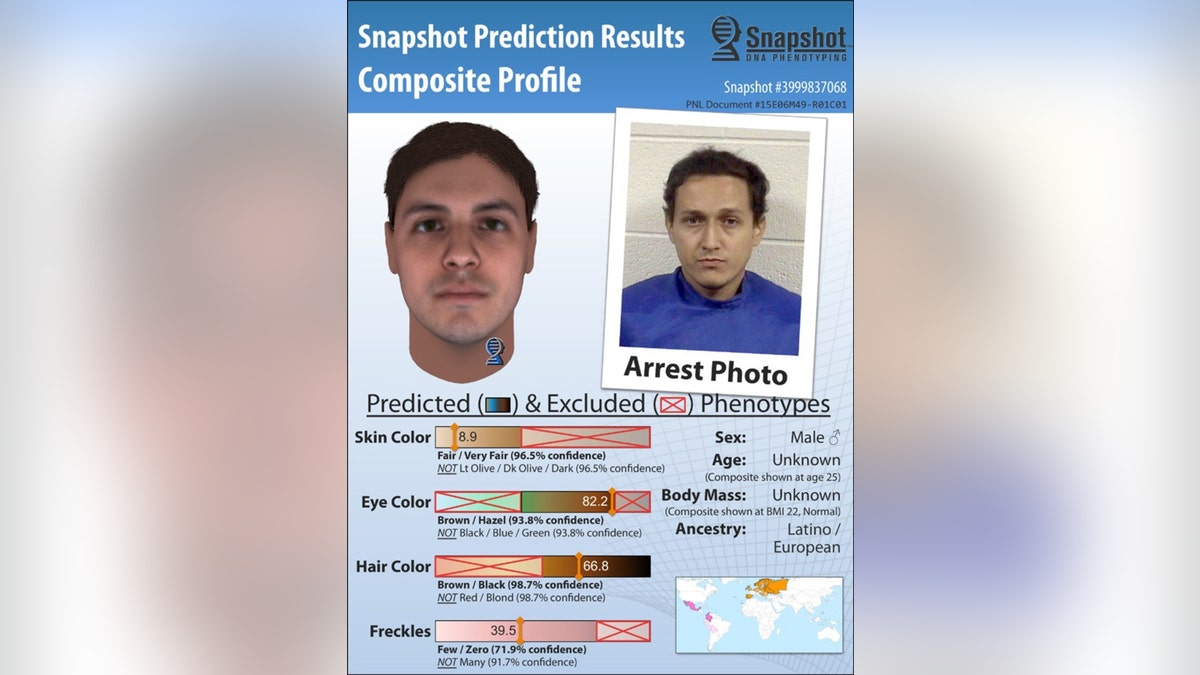
File image (Credit: Parabon NanoLabs)
Bad news for criminals who are trying to remain hidden, nameless and faceless. New technology can predict what a terrorist’s face looks like from less than a drop of blood or single strand of hair.
Called the Parabon Snapshot, this new groundbreaking technology can take traces of DNA and literally put a face to the crime.
From a terrorist who built a bomb intended to kill hundreds of Americans through to a thief who stole your grandmother's handbag, this is the sort of American innovation that makes it hard for a bad guy to stay anonymous.
THIS FOAM COULD SAVE YOUR LIFE
Defense Threat Reduction Agency (DTRA) funded this exciting innovation and Parabon NanoLabs created it. DTRA safeguards Americans by focusing on combating weapons of mass destruction around the clock.
In war zones such as Iraq and Afghanistan, there are networks that build improvised explosive devices or IEDs. As such, there has been an urgent need to provide enhanced tools to help military teams identify, track, dismantle and defeat terrorist networks.
Similarly, terrorist plots such as the recent attacks in Manchester, Brussels and Paris have involved explosive devices so investigators immediately searched for clues to identify the bombmaker or possible bomb making network.
Snapshot is one very exciting solution for both the military and law enforcement. If the bombmaker left any trace of DNA, then the tech can take it and read the DNA’s code to build a composite image of the bombmaker.
PARIS AIR SHOW: 4 NEW EXCITING AIRCRAFT FEATURED
What’s the picture like?
This new technology can build a picture, but how good is it? Extremely good.
Snapshot can predict the shape of a person’s face. Within the face, it will predict the terrorist or criminal’s eye color and hair color. The tech can reveal skin color, going so far as to add the degree of freckling or pigmentation.
And it can accurately predict not just the appearance of the criminal, but also biogeographic ancestry in great detail as well.
How does it work?
In the simplest terms, the Parabon Snapshot uses DNA to build a picture of what a criminal looks like.
Effectively, Snapshot reverse engineers the DNA to provide a picture. It can do this because DNA carries genetic instruction that dictates a person’s physical characteristics. Snapshot understands how this genetic data translates into physical appearance.
If you give Snapshot a DNA sample, it can then read thousands of the genotypes – also known as genetic variants – and translate them into a visual image of a perpetrator.
82ND AIRBORNE TURNS 100: HERE ARE 4 MAJOR INNOVATIONS OVER THE PAST 100 YEARS
Why is it used?
This is a big leap ahead for the use of DNA in capturing terrorists and criminals.
Just like how each person’s fingerprint is unique, the same is true for DNA. A forensic DNA sample from a crime scene or terrorist strike can be matched to a database, for example, to try to identify the culprit.
But now if there is no match in a database, then there is still a way to use the DNA to put a face to the crime.
Investigators can use the DNA as a human blueprint too and have Snapshot transform it into a picture.
Capturing criminals
Early adopters in law enforcement, military and counter terrorism team have had great success with this new tool. It has been so successful that in that short span of time, Snapshot has been used by more than 80 agencies and Snapshot analysis has been undertaken in ten countries.
Investigators have been using Snapshot to help solve tough current criminal cases as well as crack cold cases.
Detectives from the Montgomery County Police Department in Maryland, for example, recently used the Parabon technology to create a composite for a suspect in a series of unsolved burglaries and rapes that occurred between June 19, 2010 and Sept. 2, 2012.
The technology has also reportedly been used by police in Florida to make arrests related to a 2011 homicide.
Rockingham County Sherriff’s Office in North Carolina also used Parabon technology during its successful investigation into the murders of Douglas "Troy" and LaDonna French. Although there was lots of different DNA at the crime scene, there was no police database match. In Januray 2015, a month after the debut of Parabon's Snapshot service, Rockingham County Sherriff’s Office contacted the company. José Alvarez, Jr. was arrested for the murder in August 2015.
In July 2016 Alvarez pled guilty to two counts of first-degree murder and was sentenced to two consecutive life terms without the possibility of parole.
Other applications
Beyond a military and law enforcement tool, Parabon says it is developing other potential applications for their research, including the ability to predict the risk of developing Alzheimer’s Disease.








































